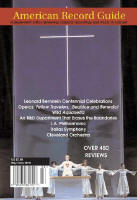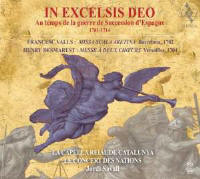Texte paru dans: / Appeared in: Alia Vox |
|
|
Outil de traduction ~ (Très approximatif) |
|
|
Reviewer: John
W. Barker Among other things, this is one of those “where-do-we-put-this?” releases.
It is one of Savall’s CD Book
ventures, but without the book-size album, though it has a thick, 253-page
paperback volume (with multilingual essays) as its “booklet” in the standard
CD album format. It is presented as another of Savall’s historical
panoramas, with the title of “In Excelsis Deo: In the Time of the War of
Spanish Succession, 1701-1714”. “In the Time of” is the trick phrase here,
for the two major works presented have nothing directly to do with that war,
even if composed in the time period. The combination of those two works was
made into a program performed in public concerts that Savall gave in his
busy year of 2016, and this comes from the program given at the Royal
Chapel of the Versailles Chateau in July of that year. In point of fact, the
program is as much a celebration of Savall’s rich involvement with the
Versailles Chapel over the years as of anything else.
Francesc [or Francesco] Valls
(1671-1747) was the most important of early Catalan composers. Since
Catalunya as a region supported the Hapsburg claims to the Spanish crown,
Valls is sucked along with that. As cathedral director in Barcelona, he
produced a great deal of sacred music, bits of which have been recorded over
the years. He composed some nine Mass settings, of which by far his most
celebrated work is this 11-voice masterpiece that dates from 1702. In it his
forces are divided into four distinct choirs—three of solo and choral
singers and one of instruments (two violins, doubled by oboes, cello, two
organs, harp, and two trumpets with timpani). Valls gave the work its “Scala
Aretina” title because he used the traditional hexachord of Guido d’Arezzo
as a cantus firmus. The work actually provoked violent controversy over the
composer’s counterpoint and his introduction ofan unconventional dissonance
at one point. To our ears it is full of beauty and imagination. So far as I
can find, there have been three earlier recordings. A rather ponderous one
led by John Hoban in a CD reissue (CRD 3371: S/O 1995) was followed by a
1993 recording (combined with Biber’s Requiem), again with large choir but
with period instruments, led by Gustav Leonhardt for German Harmonia Mundi
(77277: N/D 1993). Most recently, we have a recording of this Mass, plus
some of the composer’s shorter sacred works, made under Albert Recasens (Lauda
14: M/J 2015): a very stripped-down rendition, one performer per part. Those predecessors may not all be available, but Savall’s performance does not entirely eclipse them. His vocal forces number 26 singers and 24 instrumentalists including flutes and bassoons. Savall captures the lyrical sweep and contrapuntal cleverness of the work, but the total seems a bit blurred and dense, perhaps owing to the Versailles Chapel acoustics.
Since Valls was a Catalan, and
his Mass takes barely 35 minutes, there is space for fillers. Savall takes
advantage of the national connection—and perhaps even inspiration from the
recent Catalan separatist movement— to throw in five short works, mostly
Catalan patriotic songs that he has recorded before in his own arrangements.
Almost buried here in the fuss
over Valls, Henry Desmarest [or Desmarets] (1661-1741) has his say in the
second disc. He was a prolific composer of both theatrical and sacred works.
In his colorful and disruptive life, he really served as a partner to
Lalande in developing the French Baroque motet. A number of the shorter
sacred ones have appeared in several releases, but this is the first
recording of his ambitious treatment of the Mass, his only one. King Louis
XIV, the composer’s employer at the time, preferred motets over full Mass
renditions in his chapel. Nevertheless, the King apparently did attend a
performance of this work, at some time around 1704. Again, this Mass has
absolutely no connection to the War of Spanish Succession, even if Desmarest
did, around 1701, begin a few years in service to the triumphant Bourbon
King of Spain, Philip V.
Stylistically, this unique
Mass by Desmarest might be understood as a blending of French and Spanish
Baroque elements. It is an extraordinarily big work, lasting a full hour.
Like Valls, Desmarest divided the major items in the Ordinary into many
movements, mostly brief: thus, the Gloria is in 7 sections, the Credo into
no less than 18! (By comparison, Valls divided his Gloria into 5 sections,
his Credo into 6—and omitted the Benedictus.) That microcosmic choice by
Desmarest has its negating effects, as the mostly little bits process by in
relentless continuity. There are beautiful moments to emerge, and the
dialogs between the two groupings of performers can be interesting.
Nevertheless, the work seems to lack an overall unity. I have to say that I
found it in toto a bit tiring and even self-defeating. The performing forces are 25 singers and 13 instrumentalists here. Missing parts in the surviving scores have had to be recreated. Savall labors admirably to make this whole business work, but I emerge from it rather disappointed — essentially the composer’s fault, not the conductor’s.
| |
|
|
|
|
Cliquez l'un ou l'autre
bouton pour découvrir bien d'autres critiques de CD |
|




